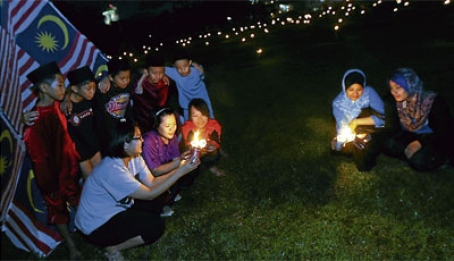This is what true learning means
Professor Tan Sri Dato' Dzulkifli Abdul Razak
Comment
New Sunday Times - 11-09-2012

Comment
New Sunday Times - 11-09-2012
NATIONAL EDUCATION BLUEPRINT 2012-2025: These are the ingredients for transformational change

Teachers can spark interest in students.
EDUCATION is always about change. Foremost, it is at the level of thought, to better understand and effect the change. The more effective the change, the more pervasive the influence.
In turn, it will result in a wide-ranging behavioural change, and eventually, create an impact on the destiny of the person, community and nation.
These are the ingredients for a transformational change that we need to be aware of. If "thought" remains unaffected, it can be the biggest set of barriers to change, thus, "mindset" change is a challenge that all transformation faces.
"Paradigm shift" is another frequently used phrase, though this is mostly focused on scientific, revolutionary change.
A major shift in paradigm is also related to the thought process that must first undergo an equally radical change, illustrated by the term "thinking outside the box". Bureaucracy and over-regulation are two good examples of what the box is all about, invisible as it is, but powerful nonetheless.
The "boxed-in" mentality is made worse by the culture of "fear" to challenge the existing rules as though they are cast in stone. This is the mindscape that must be set free to inquire, explore and discover in shaping new thought processes.
That is also why autonomy is dearly guarded by most as the ethos of learning before it degenerates into some routine way of doing things: boring, dull and mundane.
It is no longer about blind compliance, but actively questioning and seeking a more in-depth meaning to what is to be learned, unlearned and relearned. This is the basis of transformation in education.
Viewed in this way, the classroom ceases to be where students are normally kept to learn. In contrast, the mind of the child is in fact the classroom.
Teachers are no longer the ones in front of the classrooms but the ones who inspire and motivate so that they remain in the "minds" (the "new" classrooms) of the children all the time.
Neither do teachers need to know, or pretend to know, all the answers.
As motivators, they need to inspire students where to look for them or rather (re)discover them because learning is about discovery.
The discovery must begin with the self and gradually extend to the natural surroundings, including the socio-cultural environment.
Already, what is known as "schooling" today is gradually metamorphosing into a kind of open learning as part of a lifelong process.
The United Nations Educational, Scientific and Cultural Organisation's Report of the International Commission on Education for the 21st century aptly introduces "the four pillars of learning", the fundamental principles for reshaping education.
They are:
LEARNING to know is about learning as both a means and an end of human existence.
People have to learn to understand their world and its complexities, and to provide an appropriate and adequate foundation for future learning.
LEARNING to do is about transforming certified skills into personal competence to enable individuals to effectively participate in the local and global setting and society.
It is backed by a mixed set of skills/competencies and talents, social behaviour, initiatives and willingness to adapt in a variety of work-live environment.
People must learn to act appropriately in any kind of situation and become involved in shaping the future.
LEARNING to live together should help in inculcating a spirit of empathy in students so that it can have a positive effect on their social behaviour throughout their lives.
It is to expose individuals to the values and intercultural understanding, respect and trust at all levels of society to enhance human dignity based on the relationships of peace and harmony.
Resolving conflicts through dialogue and discussion is considered the essential tools of present day education.
LEARNING to be aimed at the complete fulfilment of the human person in a holistic way as an individual, member of a family and community and as a responsible citizen. This is to enable individuals to develop to their fullest potential for an all-round complete person, based on universally shared values while appreciating diversity.
All these will be in many ways spelled out in the National Education Blueprint 2013-2025 which serves as a good starting point to contemplate the transformational journey.
What is new would be the mindscape, a mental blueprint that would allow the national education philosophy to be translated into reality for the 21st century.
But only if we first watch our thoughts so that the final destiny could be realised with ease.
- The writer is the vice-chancellor of Albukhary International University
